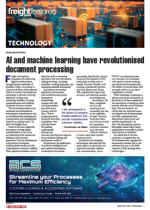Freight and logistics companies are embracing digital transformation, recognising the multitude of benefits it offers. According to Courtney de Beer, chief technical officer at Contra Consolidations, technology is pivotal in driving efficiency, cutting costs, enhancing visibility, boosting competitiveness and enabling innovative business models. "The forwarding industry has witnessed several significant technological advancements that are fundamentally reshaping the transportation and management of goods on a global scale," De Beer told Freight News.“Some of the most impactful innovations driving digital transformation in the sector are enhancing both operational efficiency and customer experience. One key development is the advent of company-enabled platforms that provide comprehensive customer visibility. These platforms facilitate various functions such as obtaining quotations and rate information, making bookings, accessing schedules, tracking shipments and managing essential documents.”Automation was another significant advancement, with workf lows and system integrations streamlining routine tasks and ensuring seamless data f low across systems, said De Beer. “This is complemented by advanced reporting capabilities, with tools like Power BI enabling sophisticated internal and external reporting that supports better decision-making and performance analysis.”Furthermore, the application of artificial intelligence (AI) and machine learning has revolutionised document processing. Specifically, Optical Character Recognition (OCR) technology is being used to handle Accounts Payable (AP) invoices, commercial invoices, and both Master and House Bills, significantly improving accuracy and reducing manual processing time.According to De Beer, companies are not only investing in the technology but also in the capability of staff. “Internal developers have also become crucial for companies looking to enhance and customise software solutions to better meet their specific business needs.”He believes the emerging technologies that have had the most impact on operations are improved customer visibility and communication. “As an NVOCC we understand that our customers are inundated with queries around tracking, quotations and documentation. Our ability to provide them with essential tools to access these capabilities is critical.”With technology continuing to advance and more automation on the horizon, De Beer emphasised the importance of setting up these systems with the correct business logic. “For our business, it’s crucial that our technical teams are aligned with all departments and fully comprehend each department’s pain points and specific requirements,” he said. “All automations must be thoroughly tested before being implemented externally to ensure they function as intended.”He added that it was also essential to recognise that not all businesses were equipped for automation, whether due to the software they use or the skills required to fully leverage these technologies. LV

